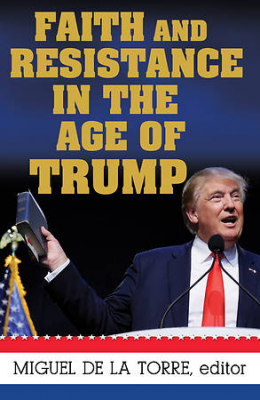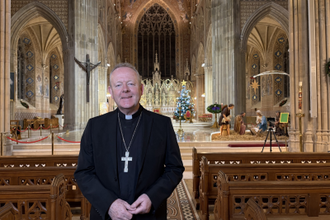Book: Faith and Resistance in the Age of Trump

Faith and Resistance in the Age of Trump, Miguel A De La Torre (editor),Orbis Books, 2017, £19.99 (available from Alban Books Edinburgh).
One year and a half ago the impossible happened in the United States: Donald Trump, a New York real estate mogul, former casino owner, known womaniser and with dubious financial connections with Russian mafiosi was elected President.
Catholic commentator Garry Wills has called President Donald A Trump an "irreligious lecher". Yet Trump received the votes of more than 80% of white evangelicals. Jim Wallis, founder of Washington-based Sojourners, writes in this very worrying book that Donald Trump ran on white identity politics and brought white nationalism back into the mainstream of American national life. Wallis wrote elsewhere that white evangelicals voted for Trump because they were more white than evangelical. He wants to make the United States white again.
Trump's campaign was an exercise in promoting nostalgia for a past longed for by millions. Some wanted to travel in Trump's time machine back to the 30s before Roosevelt. Others longed for the 50s when coal was king and factory jobs plentiful. The big crunch came in the 60s. For racist whites, figures like Martin Luther King, the founders of Black Power and Lyndon Johnson who signed the Civil Rights Act were anathema. Older men could never adjust themselves to the challenges represented by the women's movement. For most Catholics, evangelicals and Mormons the 60s brought the sexual revolution with the availability of contraception and abortion, and more recently the affirmation of LBGTQ identities. They had to hold their noses-and they did-at Trump's conspicuous misogynism, racism, sexism and his rank disregard for truth.
This book brings together in twenty-five short vivid hard-hitting chapters the concerns, not to say trepidations, of several constituencies of the US population which feel intimidated by what a Trump presidency could mean for their communities. Each Chapter is written by a member of the constituency concerned. For example, Marvin M. Ellison, a member of the LBGTQ community, writes that Mr Trump has a preferential option for all things white, male, heterosexual and rich within a Christian-supremacist social order. Ellison teaches at Union Theological Seminary in New York and has written extensively on contemporary sexual ethics. He goes on to say that Trump has succeeded in cultivating a pervasive sense of fear, powerlessness, loneliness and vulnerability found in increasing numbers of people within a neo-liberal social order.
Disturbing for Christians should be what Ellison has called a Christian-supremacist social order. This would be what US evangelicals have been working toward since the days of Richard Nixon who was closely pastored by the recently deceased Billy Graham. Trump meets weekly with a sizeable group of evangelicals to pray and break bread together. Many evangelicals regard Trump as "God's anointed". He will restore Gospel order the way the Founding Fathers willed it. Indeed some believe he is the one who will prepare the Second Coming with its rapture and apocalypse.
Perhaps the most worrying area of concern is the environment. President Trump denies the reality of climate change and is ignorant of the impact of fracking on human health. As a result his appointed head of the Environmental Protection Agency is also a climate change denier. The Republican-controlled Congress is enacting legislation which will allow oil exploration in forty National Parks. This will nullify the very concept of what a National Park is all about. And from the beginning of the Trump presidency there is no link on the White House website to anything that has to do with the environment.
One other constituency is one that has been on the North American continent since 1650: the black Afro-American. Between 1650 and 1863, year of the partial emancipation of slaves, ten generations of them, five million died-either in transport or in the fields or in various forms of punishment. Charles Dickens, in his American Notes, points to the white mother who promises her little boy a whip for his birthday to punish "the little niggers" who get out of hand.
The late James Baldwin, renowned US author, black and gay, wrote in his The Fire Next Time, "…the political institutions of any nation are always menaced and are ultimately controlled by the spiritual state of that nation." This book has much to say about the spiritual state of a nation governed by the like of Donald Trump. Kelly Ann Douglas writes in her piece: "The time has come in this era of a Trump presidency for us to be a people with a moral memory, a moral identity, and moral participation."
And so the question becomes: what can be done. The editor of this fine collection writes in his Conclusion that what is needed is an ethics and praxis of joder. This is a Spanish word one would not use in polite society. In a society rife with institutional violence one must become a right royal pain in the rear end. To joder is to cause trouble (echo of words of Pope Francis to youth), to disrupt the established norm, to create instability and to upset the prevailing social order which covers up the disorder in which countless millions live and which prolongs the injustice which marks their lives. To joder is an act of love which forces the oppressors to confront their complicity with oppressive structures. It is a non-violent survival strategy based on love designed to liberate abused and abuser alike.
This book is not just about the United States of Trump. It is about the gradual drift towards a right-wing fascism supported by millions of mostly white Europeans and North Americans who have lost faith in their swamp-dwelling politicians, who feel the chill of an economic downturn in their future well-being and who reject the arrival of foreigners who they fear will encroach on their space and question their cultural identity.
Ireland's Taoiseach Leo Varadkar marched in New York's Archdiocesan St Patrick's Day parade, along with his partner, without controversy. This is the kind of change Trump voters reject.
This book addresses the relationship between our Faith and our politics. Our politics, beyond our ideologies, our economic interests, our cultural identities, is a politics guided by Christ's call to build up and await God's reign of peace, justice and wholiness.
We are social/communal beings, yet we have fragmented into individuals fearful of "the other". North American Christians are sinking into a comfortable personal relationship with a blue-eyed blonde dashboard Jesus who looks a lot like themselves. To destroy that idol concerned Christians must reach out to "the others" who come seeking a better life, many of them without the protection of legality. This implies acting politically, embracing political agendas and belonging to political grassroots organisations. We must listen to God's query: "where is your brother?"
Pope Francis, speaking some years ago, in Lampedusa, criticised the "globalisation of indifference". We are so accustomed to the suffering in Yemen, Syria, Eritrea, Niger, Mali etc that our compassion has become dull and fatigued, our awareness dim.
The coming of Donald Trump, a known xenophobe (despite his foreign wives) is a threat to the US and world community. He embodies all that is wrong with US materialist, consumerist and fundamentalist Christian culture.
Our Christian tradition offers a vision of the human being living in right and responsible relationship with all of humanity and with all planetary life. It is a vision shared by many who live outside our tradition. All of us share a vocation and have heard a call to struggle to build up a human community, world-wide, and nurture a planet almost choked and exhausted by a greedy and exploitative materialist culture. We are called to live and act in faith, resistance, solidarity and healing. Only thus can we envision a just society, a healed humanity and a protected planet.


















